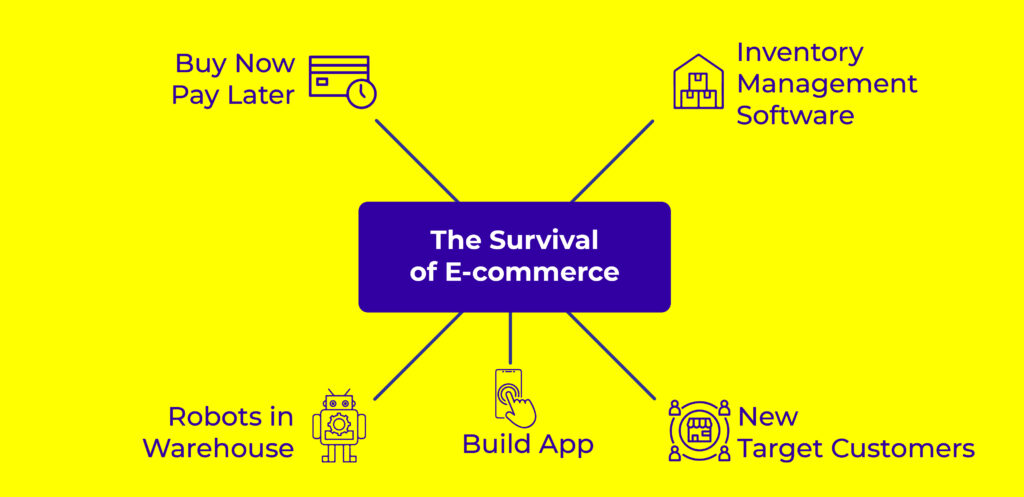The devastating effects of coronavirus have boomeranged. With the second wave of virus hitting us harder, the government is reimposing a lockdown to contain the spread, subsequently impacting the e-commerce business in the process. Apprehensions to shop out and limit shop hours have increased people’s appetite to shop from online channels that have led to skyrocketing of grocery purchases, but there is another side to the story.
Online Grocery Sales Enough to Sustain?
Although online grocery purchases have increased, e-commerce businesses are battling the underlying challenges of the pandemic. A pause on selling non-essentials has aggravated losses in the e-commerce businesses since food and grocery contribute only $2.5-$3.5 billion to the overall $38 billion e-commerce sector in India, according to Technopak, a management consultancy firm. To ensure business continuity, e-commerce businesses are ramping up their e-grocery segment that is high in demand but has low value and low margins, which is unlikely to compensate for the losses incurred from low demand and sales from non-essentials. The other challenges of e-commerce business include working with reduced manpower, increased waiting times of delivery, slow operations, and irregularities in supply chain and logistics. Therefore, this demands an overall transformation in business functions spanning from inventory and warehouse management to tapping new consumer segments and surviving the pandemic as well as post-covid environment.
‘‘
A pause on selling non-essentials has aggravated losses since food and grocery contribute only $2.5-$3.5 billion to the overall $38 billion e-commerce sector in India, according to Technopak.
Survival Strategies to Tide over the pandemic
The survival strategies should focus on building efficacy in business operations and growth. Below are some of the survival strategies that e-commerce businesses can implement:
Robots in the warehouse
Due to control measures, e-commerce businesses are countering manpower shortage, therefore, reducing efficiency in operations and impacting the revenue. Robots are being deployed in the warehouses of e-commerce giants to aid with tasks like sorting, shipping, and packing. The adoption of automation in the warehouses will help control the spread of infection and smoothen the operations. The use of collaborative robots in e-commerce businesses can be implemented for distribution and order fulfillment, palletizing, labelling, barcode scanning, etc. thus ensuring frictionless operations.
Inventory Management Software
Proper Inventory management is integral to boost customer acquisition and retention. Businesses need to maintain adequate stock as well as avoid overstocking, which can lead to wastage majorly in perishable goods, this is where inventory management software comes to the rescue. The software will help businesses predict the required stocks and forecast sales based on the current demand. It cautions sellers regarding any surge in demand and avoids mismanagement of supplies.
New Payment Method
The electronics segment holds a lion’s share in India’s e-commerce business. To motivate shoppers to purchase non-essentials such as TV, smartphones, laptops, and tablets, e-commerce businesses should introduce ‘Buy Now Pay Later’ (BNPL) payment at the checkout stage. In BNPL, the customer does not need to pay the full amount at the time of purchase but it breaks down a large amount into small easily payable EMI. In this manner, the customers can afford to purchase expensive items and encourage aspirational buying.
Focussed marketing through App
The app of an e-commerce business is the new online storefront. With varying consumer preferences, businesses should emphasise more on integrating AI and ML in their apps to gather consumer insights and execute more intent-based campaigns, target channels, and better communication. The integration of machine learning algorithms with apps will utilise past data to decode consumer data whereas AI simulates human intelligence. This benefits the e-commerce businesses by offering improved user segmentation and a personalised customer experience. Marketing for e-commerce in the post-covid world will change its gear from discount and sales to customer experience and satisfaction.
Unlock new target customers and nurture them
E-commerce businesses have witnessed many first-time online shoppers from semi-urban parts of India. According to EY India Internet penetration in rural and semi-urban areas is expected to more than double to 45% by 2021. Increasing aspirations to live like urban dwellers is also a reason for e-commerce shopping, therefore they should focus and nurture them to get the first-movers advantage.

Reviving e-commerce from distress times
The roll-out of vaccines is a beacon of hope in such distressing times. The frontline workers comprising delivery executives, workers in fulfillment centres, and warehouses are the wheels of the e-commerce chariot. They have been serving the nation tirelessly despite being most vulnerable to contract the virus. One of the determiners that customers will shop from your brand is the efficient delivery system Therefore, it is imperative for the companies to proactively invest in vaccination activities for their frontline employees and in-house employees to ensure that they can work in full capacity. Currently, Indian e-commerce and retail collectively employ around 40 million. This raises a question: how will the businesses vaccinate their workforce?
Below are some of the strategies that will help businesses to vaccinate their workforce:
Reimbursement of vaccines and education
Companies can reimburse the cost of vaccination and encourage more employees to take vaccines. They can also organise awareness sessions with their employees to clarify ambiguities about the vaccine and foster the confidence that the vaccine is safe.
On-Site vaccination
Businesses can organise vaccination drives in association with licensed health care providers in their workplace free of cost to ensure none of the employees is remaining.
Partnering with hospitals
Companies can book vaccination slots for their employees and organise a ticket system that will help employees to reach the hospital at the designated time slot to get vaccinated.
Incentives for employees
Amazon US will offer $100 as an incentive to the new hires with proof of Covid-19 vaccination. Similarly, e-commerce businesses in India too can offer incentives to their employees for getting vaccinated after showing the proof.
Though vaccination programmes have launched, companies need better planning for allocating the vaccines as the supply is limited. They need to find out who is more vulnerable based on age, or department-wise like the delivery executives as they are commuting to various places to deliver and hold a higher risk of infection.




